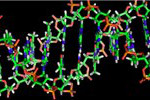 WIKIPEDIA, RICHARD WHEELERWhile useful for some applications, whole-genome sequencing (WGS) must still overcome challenges before it’s ready for routine clinical use, researchers from Stanford University showed in a study published in JAMA this week (March 11). The team sequenced 12 healthy volunteers using two different platforms, finding inconsistencies between the two.
WIKIPEDIA, RICHARD WHEELERWhile useful for some applications, whole-genome sequencing (WGS) must still overcome challenges before it’s ready for routine clinical use, researchers from Stanford University showed in a study published in JAMA this week (March 11). The team sequenced 12 healthy volunteers using two different platforms, finding inconsistencies between the two.
“This report is sobering, but not at all surprising,” Eric Topol from the Scripps Translational Science Institute in La Jolla, California, who was not involved in the work, told The Scientist.
“Not until we have millions of individuals with WGS, across various medical conditions and ancestries, will sequencing be adequately informative,” he added. “We’re at least a few years away for that to be the case.”
 WIKIMEDIA, CALLE EKLUND/V-WOLFBlood-based biomarkers could be used to predict future cognitive impairment in asymptomatic older adults, Georgetown University Medical Center’s Howard Federoff and his colleagues showed this week (March 9) in Nature Medicine. The researchers found that a panel of 10 metabolites from peripheral blood were predictive of whether an elderly person who showed no signs of cognitive problems would go on to develop either mild memory impairment or Alzheimer’s disease within two to three years.
WIKIMEDIA, CALLE EKLUND/V-WOLFBlood-based biomarkers could be used to predict future cognitive impairment in asymptomatic older adults, Georgetown University Medical Center’s Howard Federoff and his colleagues showed this week (March 9) in Nature Medicine. The researchers found that a panel of 10 metabolites from peripheral blood were predictive of whether an elderly person who showed no signs of cognitive problems would go on to develop either mild memory impairment or Alzheimer’s disease within two to three years.
The study builds upon researchers’ recent interests in unraveling how aberrant lipid metabolism could play a role in neurodegeneration. “We have speculated that [changes in] the lipids that are important for proper [cell] membrane ...



















